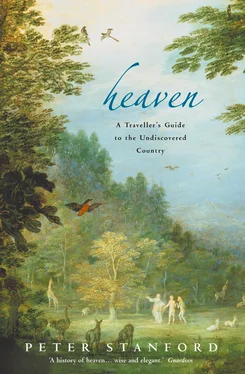There is an enormous contrast, then, between the reality of Buddha’s teachings and my half-awake efforts at toying with reincarnation as something to keep grief and loss at bay when cold reason offers no relief. As a simple answer to the eternal dilemma of suffering, Buddha realised, reincarnation only works in parts. It introduces a tangible degree of justice into each individual death to replace the injustices of each individual life by teaching that sinners will return humbled and the righteous will enjoy greater favour in their next incarnation, but fundamentally it embraces earthly suffering as each individual goes on and on and on trying to achieve enlightenment.
There is another drawback, even to the caricature of reincarnation that is now embraced by many in the West as a way of avoiding their own mortality. Such a scheme of things can only reassure those who have a high opinion of their own merits. My mother, who suffered the ravages of multiple sclerosis for forty years with exemplary steadfastness, once admitted to me, devout Catholic though she was, that she had tried to imagine reincarnation, albeit distorted through the filter of Catholic guilt, but had decided that rather than get an upgrade she would come back as a cow and have to endure what for her was unendurable – flies constantly landing on her face and her having no way of shooing them away.
Flirting with reincarnation appeals only to that arrogant, selfish, self-absorbed part of us all that cannot quite believe that our own death will be the end. This is the eternal attraction of every other form of belief in an afterlife. We may act every day as though we disbelieve the inevitability of death – driving too fast along a rain-soaked motorway, hanging on to the tail lights of the car in front, popping pills which will give us a high but which may also kill us – but in the midst of our oddly ambiguous relationship with mortality, there is always the abiding thought that, even if the inevitable happens, our unique being, shaped so laboriously, must live on in some form. Surely we cannot just vanish in a split second.
Sometimes I sit at traffic lights, my foot twitching on the accelerator of the car, and try to contemplate what would happen if I shot out into the line of oncoming traffic. More specifically, what would happen if I killed myself doing it? Would it all go blank at once, as doctors tell grieving relatives, reassuring them that their loved one wouldn’t have felt a thing at the moment of death? Or would I, in best Hollywood tradition, float up out of my body and look down on the crumpled tangle of cars I had left in my wake? And, if there is an afterlife, at what stage does it kick in? Straight away, after the funeral when I have the Church’s blessing, or after a sojourn in purgatory when I have waited in a queue for a few months (or years) and people on earth have prayed for the repose of my soul? I’ve never been good at queuing, and even if I managed to stick it out, what would I get to at the end? Would I even recognise it as having any connection with what went before? Would it be a physical landscape, or an illusory one? Would it exist outside my imagination, or would it even exist at all? Would others be there too? Would they recognise me? Suddenly oblivion seems so much more straightforward. As the lights turn to green and I cautiously set off on my way, I realise that these seemingly overwhelming questions are so earthbound as to be trivial compared with what I am contemplating.
Yet what is absolutely true is that we fear death because we fear the unknown: the rich build monuments to earn immortality, the wordy write books which will sit in library catalogues forever after, and the competitive strain to get their names engraved on cups and shields and prizes. All offer a kind of life after death. For the majority, however, the choice is simpler: children and/or a belief in the afterlife are our antidotes to death, the best way of cheating what scientists in a secular age tell us is the unavoidable fact of oblivion. Children can, of course, let us down as they grow up – run away from home, never darken our doorstep, and, God forbid, even predecease us – but afterlife never will. Potentially, it is the ultimate happy ending. As, it would seem, we cannot try it out and report back any feelings of disappointment, it remains nothing more than a glorious but untried promise, utterly open to the wiles of our imagination.
Yet it is a promise that is so finely attuned to our own needs and desires that it has been with humankind from the start, predating written language and philosophy and organised religion. From the time when the first Neanderthal sat next to the lump of dead protein that had been his or her mate and realised that something had to be done about the smell, we have wondered what, if anything, comes next. People have generally assumed that there should be something. When that body was put in a cave or a ditch or on to a fire or pushed over a ledge into a ravine, the one left behind looked into the void that was left and felt an emptiness and abandonment. So arose the myths, traditions and literature, the shamans and soothsayers, the priests and popes, and the poets, writers and dramatists who would attempt to provide the answer.
And so arose, too, that intimate connection between belief in a God and the hope of reward with Him or Her in life everlasting. In many faiths – particularly Western – the two are synonymous, and the link therefore goes unquestioned, but not all the world’s great religions have signed up for the two-for-the-price-of-one package deal. Buddhism has its deity, but though highly ambiguous and elusive it is basically indifferent to the notion of afterlife, which it regards as a red herring, and as something that makes religion other-worldly, irrelevant and even pessimistic. To treat nirvana as heaven would distract one from the pursuit of enlightenment in this life. Buddhism advocates the reaching of a higher state in this life rather than letting one’s dreams of a better time to come after death take hold. So Buddhism challenges its adherents to do the right thing now, for its own sake, rather than have half an eye on what might happen after death, thereby preventing any possibility of opting out of this world, standing aloof from it as certain religious groups have done down the ages, or even, as in the case of the various gnostic sects, rejecting this world as irredeemably evil. When there is nothing to work with other than the now, you have to get on with it, engage at every level. Buddhists believe one’s fate in both the present life and forever is bound up in this engagement. Most importantly, Buddhists must work to make the earth a place of justice rather than rely on inequalities being sorted out posthumously by the deity. There is no excuse for accepting the status quo.
Put briefly and in such terms, it sounds so attractive that it suddenly becomes hard to understand why the notion of heaven ever put down such deep roots. And this conviction strengthens when Buddhism’s rejection of a theology which places a greater premium on the afterlife than it does on this life is seen in the context of similar creeds which arose in the same period, roughly from 700 BC to 200 BC, known to historians as the Axial Age. Hinduism in India and Confucianism and Taoism in the Far East all stress the importance of practical compassion and concentrate on the here and now.
Yet not all faiths at this transition point in the history of religions took the particular route that excluded any great concentration on heaven. Judaism, and thereafter by association its younger sister, Christianity, was the main exception to the Axial Age trend. Infected by Zoroastrianism during the Babylonian exile (586–536 BC), Judaism has lived ever after with a highly developed eschatology (the doctrine of the last things which revolves around death, judgement and afterlife). This eschatology came as part of a parcel of beliefs. Judaism, which had hitherto flirted with other deities, also adopted a strictly monotheistic approach from Zoroastrianism. Unusually for its time, it taught of a single, good god – Ahura Mazda, the god of light – rather than a pantheon of gods and ancestor or nature spirits. Christianity and then Islam were later to join the ranks of the monotheistic faiths and also have a strong concept of heaven.
Читать дальше












